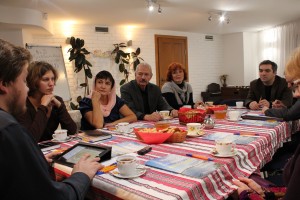 The next meeting of the Orthodox Club discussion (KPD),что действует в храме Рождества Пресвятой Богородицы было посвящено вопросам актуальности создания в современном обществе сообществ и перспектив деятельности христианских сообществ в будущем. Conversation was extremely alive, sometimes controversial, but very productive.
The next meeting of the Orthodox Club discussion (KPD),что действует в храме Рождества Пресвятой Богородицы было посвящено вопросам актуальности создания в современном обществе сообществ и перспектив деятельности христианских сообществ в будущем. Conversation was extremely alive, sometimes controversial, but very productive.
Guests of the Club of Orthodox discussion were recognized experts in various fields of knowledge: Director of the Institute of effective development of OG. Bakhtiyarov, Candidate of Economic Sciences, Associate Professor IV. Nazarov, Ph.D., Associate Professor Stamp. Prepotenskaya, Candidate of Legal Sciences, Associate Professor AV. cross, Secretary KDKD O.Mihaylova, executive director of the University of effective development V.Petichenko, Deputy Director of the University of effective development T.Kovaleva.
Traditionally, opening remarks to the subject of the meeting: "The community in society" made the ideological creator and moderator of the Club of Orthodox Discussion, rector Archpriest Oleg Melnychuk.
"Community - is a universal form of human existence, are combined together idea, the manners and foundations. This model – the only form, capable of withstanding modern challenges, standing in front of a Christian, Orthodox man, in front of his family and the Orthodox Church as a whole. Community, in the context of my pastoral ministry – this church family. Small church, ie family, united "under the dome", the center of which Christ and the Eucharist. А воспитание живой веры как механизма реализации Заповедей Божьих и есть основа земного и вечного счастья членов сообщества.
The form of organization of people in the group is present in the Bible. In the Old Testament - and this kind of knee, in the New Testament - the apostles, their first 12, later 70. After Pentecost originate the whole Christian community, referred to Churches: Jerusalem, Antiohiйskaя, Alexandria, Roman, Konstantinopolyskaya.
Father Oleg highlighted: "In today's secular world Orthodox family is unable to maintain an effective faith and live the love of God, foundations and traditions, educate children on the basis of the teachings of the Church without being in the community ".
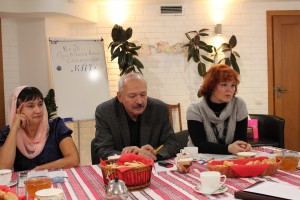
The discussion was supported Associate Professor of NTU KPI Marina Prepotenskaya, author and host of the radio studio “public square”. "Today our markets are filled with pop psychology. write affirmatsii, positive thoughts – and you will have happiness. This rejection of the connection with the higher. Youth "sweep" on psychological training. And the spirit of sectarianism not actually destroy ", – she stressed, adding, that Orthodoxy is possible and necessary to introduce to the masses with the help of modern methods of PR.
With Marina Prepotenskoy disagreed Ilya Nazarov. He said: "Today, Unfortunately, Many perceive the church as a social club and come there in search of a kind of psychotherapy. What, beautifully sung here, all is bright, spectacular, theatrical. But when it comes to some of obedience - enjoy full human spiritual vacuum. And it remains scorched earth ".
In this way, reasoning club members grew into discussion: that primary: an idea or a person, people or the leader, which organizes them? In this question, opinions were divided.
Olga Mikhailova assured, that the primary people. "If we talk about my inner feelings, the community is different from society by the presence of connections between people inside it, and the image of the leader only works within the community, rather than society. Only now society, or totalitarian, no modern Western, man is not listening, - She said. Western society is possible and understands human needs, but rather it is due to its dependency, a person engaged in the community ".
She supported Victoria Petichenko. "I agree with Olga. People – It `s that, and for what the community will be ". She added,: "The leader of the community is not necessary and perhaps even undesirable. This can be seen in the example of sects, existing, until long as all their leaders. But with their departure destroyed all ".
Deputy Director of the University of effective development Tatiana Kovaleva, in turn, noted: "The community has a different personality and each person to strive to realize themselves. There are those, who want to move on, and they, who had just entered the community. And the person needs to find a response in the community, and learn not only to take, but also to give ".
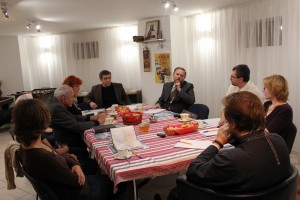
But according to Alexei Kresin, it is the primary idea for the community. "People need to communicate is itself an impetus to the creation of communities. But of course for the survival of the community or of the, that it became strong, You must have faith. will, provided in a specific person. And flexibility, the constant search for new forms. forms, able to meet the needs of community members, including in the communication ".
He summed up the theme of leadership Oleg G. Bakhtiyarov. "Is there need a leader? This is a technical point. This depends on the human. Someone needs uniforms, someone needs to march formation. Ideal community – the, which can change its structure. I was convinced by example, that is, the community, where all are equal in a calm situation, but as soon as the situation changes – built a clear hierarchical system. And everyone knows, that it is included in this hierarchy as a free man, material and not as ".
In turn, Ilya Nazarov, in front of, made it clear, that the Orthodox community leader does not need, because Christ is its leader. "If the Christian community, the leader has always – is Christ. Do I need a visible leader? maybe, but it is very desirable, that it was a man, invested with sacred dignity. And the idea is to be, but the idea is, to give, it is to do the will of God. A successful Orthodox community must be a critical mass of people, able to give ".
Against this, it was decided to summarize and to continue discussion of the community at the next meeting of the club. true, this time to focus on the, как в православном сообществе проявляются лидеры, Do they need it, and whether the issue of the lack of true leaders is not enough reason for the intensive development of Orthodox communities in modern Ukraine.
Alexei Belovol
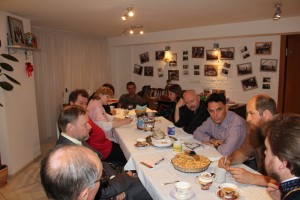
Created by discussion club to discuss topical issues of Orthodoxy
In the metropolitan church of the Nativity of the Blessed Virgin Mary, that in Pechersk, the first meeting of the discussion club with the participation of Christian thinkers recognized the Slavic world. Conversation was extremely productive. It was unanimously decided to make such meetings regular and to set up at the church of the Orthodox Club Discussions(KPD).
The idea arose because of the absence of such a platform, and at the same time the need to articulate and discuss the issues, facing contemporary Christian and modern Christianity. The initiator of a meeting in the club room of the Temple became rector Archpriest Oleg Melnychuk, обеспечив приветливый и хлебосольный прием «под Куполом».
Guests of the debut meeting of the club of the future become particularly public authorities are recognized as the methodology and cultural studies in Doctor. Nikitin, Director of the Institute of effective development of OG. Bakhtiyarov, Candidate of Economic Sciences, Associate Professor and. AT. Nazarov, philosophy with. Datsyuk.
After a short prayer, delivered to. Oleg, I began to talk, in which each voiced their vision of perception of Christianity in the modern world.
At first – on the basis of seniority – I took the floor Doctor of Cultural Studies, Vladimir Nikitin. He outlined three problems: At first, the fate of the issue of religion and books in the current era of fading text and move to screen culture. in- Secondly nowadays characterizes the longer the conflict between faith and reason, like before, and the conflict of faith and Entertainment – then the Christian faith, a new "opponent", a new challenge. Lastly, Nikitin expressed observation, that in our time the way of Christ is no longer a model for human, how it was, eg, in the Middle Ages.
Father Oleg in a short remark reminded, in turn, was a "challenge churching printing" .
Continued Call list Oleg Bakhtiyarov, speaking on the transformation of consciousness, respectively, the body, the destruction of the cultural norms and uncertainty in the identification of modern man. In his opinion, in such circumstances, the answer to the Catholic Church was the creation of the Order of the Jesuits.
In protestantizme, said Father Oleg, relationship with the consumer world of the least conflict and dialogue with modernity is quite freely. In Orthodoxy, which for a long time focused on work with the soul, there is a need to respond to the challenges of. For Orthodoxy, as indicated Olga Mikhailova – it is also a civilization, in the bosom of which we are all.
In turn, Sergei Datsyuk said, that these challenges can be understood as the Church calls, as the challenges to Christianity, as the challenges of the Orthodox civilization – all of them need to distinguish. Orthodoxy Position, as he sees – реактивная, защищается, и в этом ее слабость. А также – и в очевидной потере энергетики, связанной с потерей смысла (и это при свойственной христианству интеллектуальности!). But Nikitin expressed skepticism about TN. "Second Baptism of Rus' after the collapse of Bolshevism, and encouraged to agree with Datsyuk.
Out Datsyuk sees the revival of the traditions of elders (and, perhaps, yurodstva), who are able to resist the temptations of the consumer world and the bureaucratization of the Church. Faith in the power of the word of the elders tried to convey to others about. Oleg, приведя для примера старцев со святой горы Афон. Тому, кто не имеет такого опыта, остается судить о Православии «по часам, машинам и квартирам, это обманчиво и не перспективно”, – отметил он.
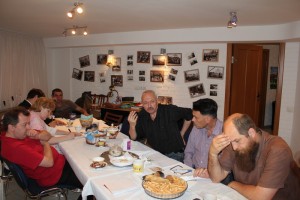
О возможности Православия реализовывать свою миссию средствами культуры говорила Виктория Петиченко, апеллируя к дневникам Александра Шмемана. В этой связи Илья Назаров напомнил, что авангардом культуры давно стала философия, причем, цитируя В.А.Демьянова, он отметил, что «философия проморгала событие Христа».
Она в лице Фомы Аквинского перехватила инициативу, секуляризировав в культуру в парадигме автономии естественного разума, по стопам Аристотеля. В культуре Бог потерян, но по мнению Назарова важно двигаться в направлении, противоположном этом бесперспективному тренду – вопреки ему. Задача интеллигенции в том и состоит, чтобы проповедовать на языке современности, связав культуру и смыслы, которые сегодня загнаны в гетто.
Свое видение Церкви как преимущественно субъекта интерпретации Игорь Гаркавенко завершил пожеланием увидеть в Церкви субъект действия. Переход может быть осуществлен через само бытие: так, совсем недавно Гаркавенко открылась связь, казалось бы, таких далеких вещей как 5-й Псалом и Закон всемирного тяготения.
С Библией ему подробно пришлось ознакомиться в тюрьме, где он отбывал срок по политической статье. Переживания на Пасхальной литургии смерти и Воскресения Бога произвело на Гаркавенко такое влияние, что теперь он считает просто необходимым «прогнать всех скопом через священное действо!». Он предложил представление о своеобразном «метафизическом авансе», который человек получает в Церкви. И хотя Сергей Дацюк видит возможность прорыва в трансценденцию только старчества, оказалось, что многие из присутствующих думают иначе.
Спич Гаркавенко тронул всех, однако был поводом для Владимира Никитина напомнить о том, что не следует путать чудо и психологический эффект. С другой стороны, Илья Назаров посоветовал не упускать из виду недобрую «третью волю». Чтобы человека отвлечь от двери, ведущей к Богу, эта «третья свобода» рисует дополнительно 999 дверей, и таким образом, по мнению Ильи Владиславовича, дирижирует культурой на современном этапе.
Путь может указать духовник, который отстраняется от своей воли, чтобы транслировать волю Бога, заметил отец Олег. При этом он согласился с ремаркой Назарова, что с духовником бывает неудобно. С другой стороны, история знает немало случаев, когда духовник влиятельного лица становился «серым кардиналом» при нем, и этот соблазн имел порой исторические последствия, о чем вспомнил Никитин.
Отвечая на вопрос о том, что такое человек, христианство традиционно выполняло миссию, которую взяла позже на себя антропология – и не справилась. Татьяна Ковалева отметила на том какую роль в Православии могли бы сыграть (хотя пока и не играют) образованные люди. Really, лакуны интеллектуального дискурса в православной традиции и стали базой для инициаторов собрания. Впрочем эта мысль не нашла поддержки – ведь задача сообщества – задавать вопросы, а не давать (или подыскивать) готовые ответы.
В такой организованности могли бы быть, по словам Никитина, три основные задачи – взаимное продвижение по смыслам, исследовательская деятельность и обсуждения проектов для общества. Бахтияров предложил учесть также возможность диалога с представителями других миров (ислама, буддизма).Но эта перспектива была отложена как неактуальная, до тех времен к тем временам, пока сообщество не окрепнет, не приобретет целостность и внутреннее понимание.
А для достижения такого взаимопонимания было решено встречаться с периодичностью раз в две недели и обсуждать заранее намеченные темы и иногда, по возможности, приглашать компетентных докладчиков.
Модератор заседания, протоиерей Олег Мельничук, предложил назвать сообщество КПД, т.е. Клуб Православной дискуссии, with which all participants unanimously agreed. At the next meeting, it was decided to discuss the adopted "Christianity in the modern world".
Olga Mikhailova